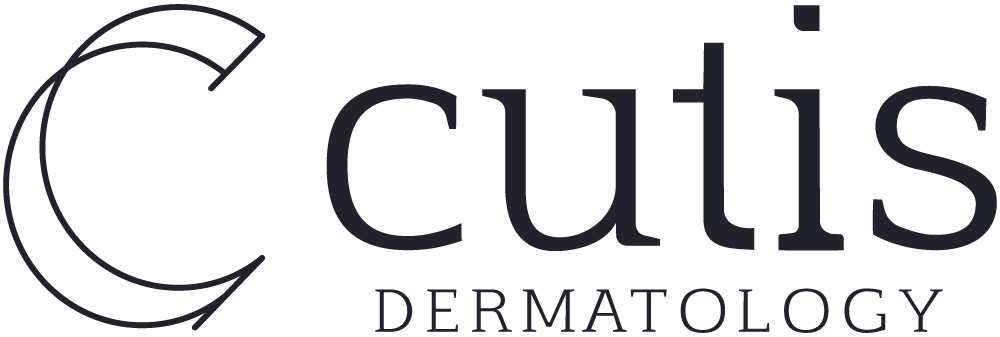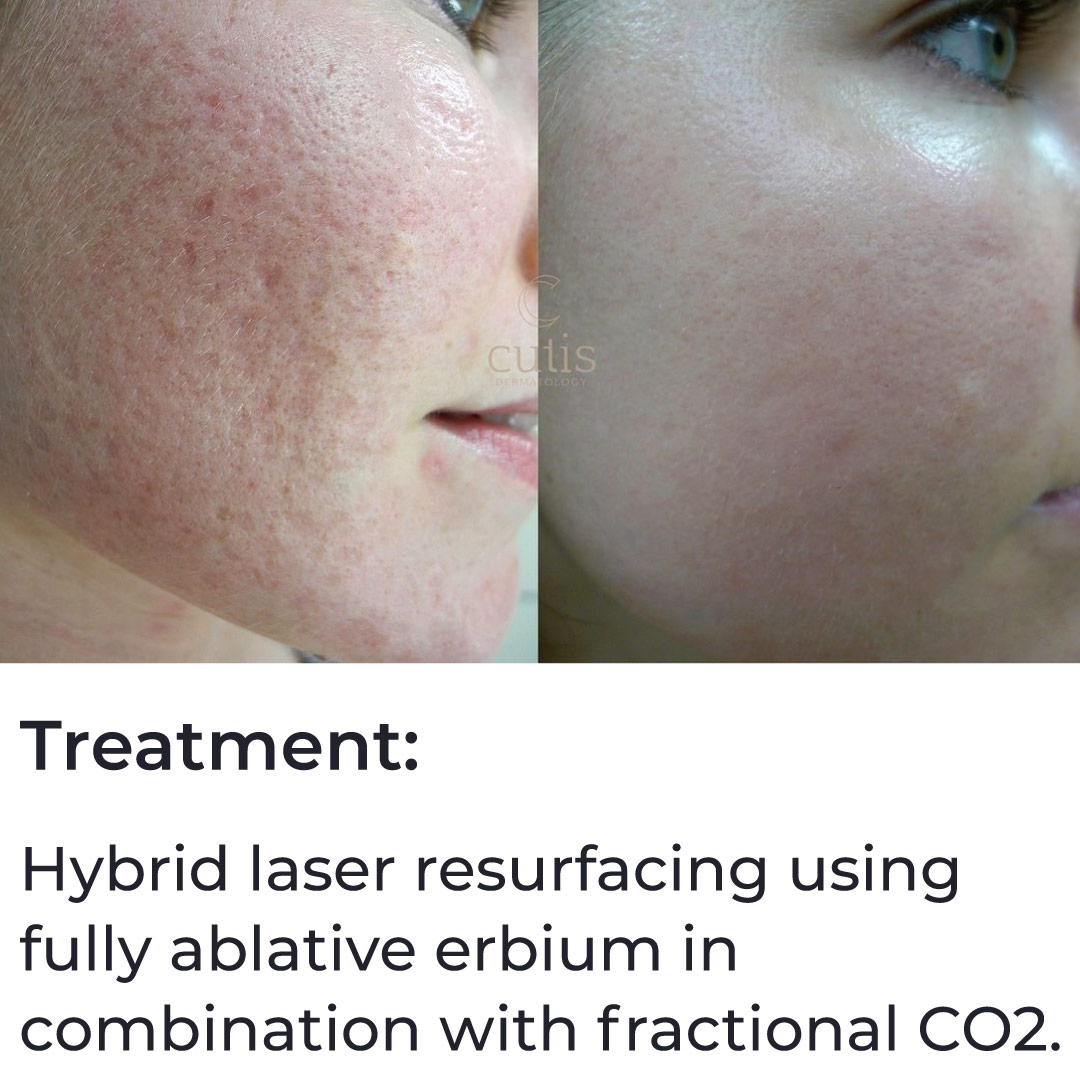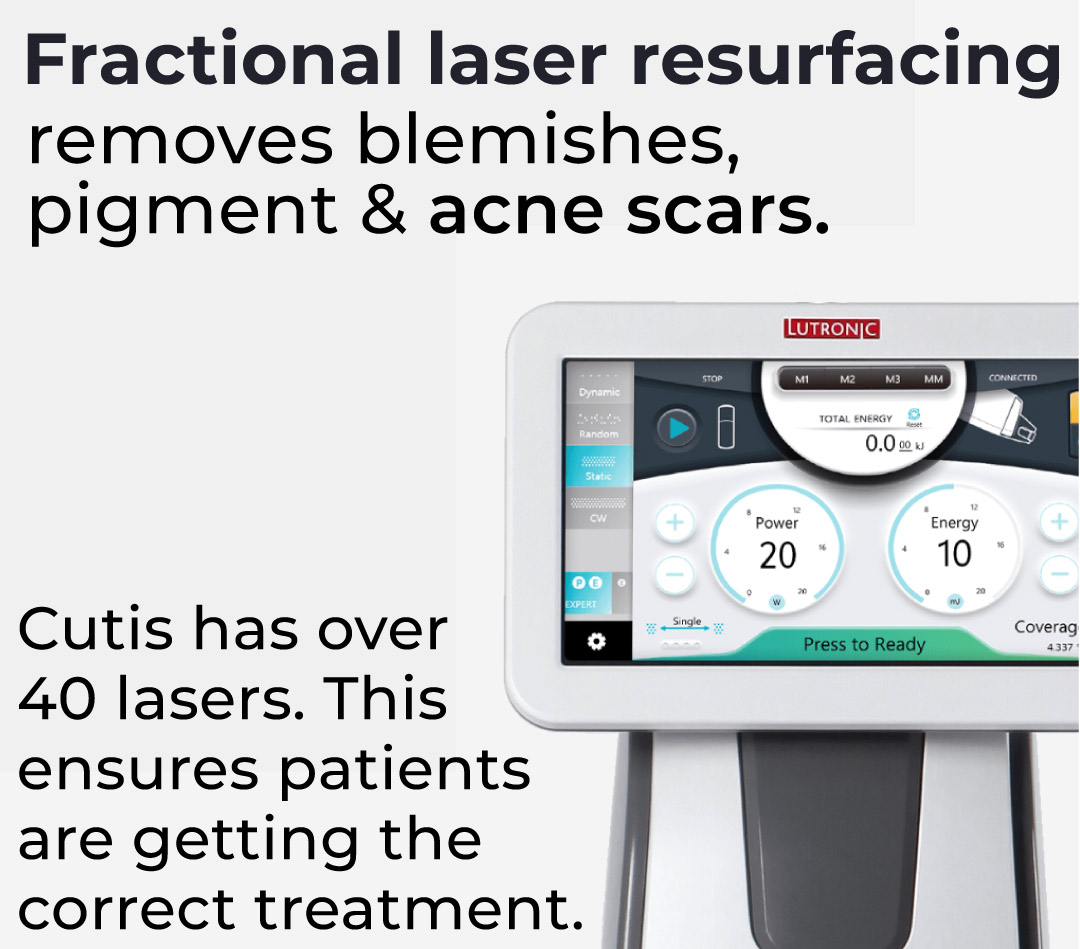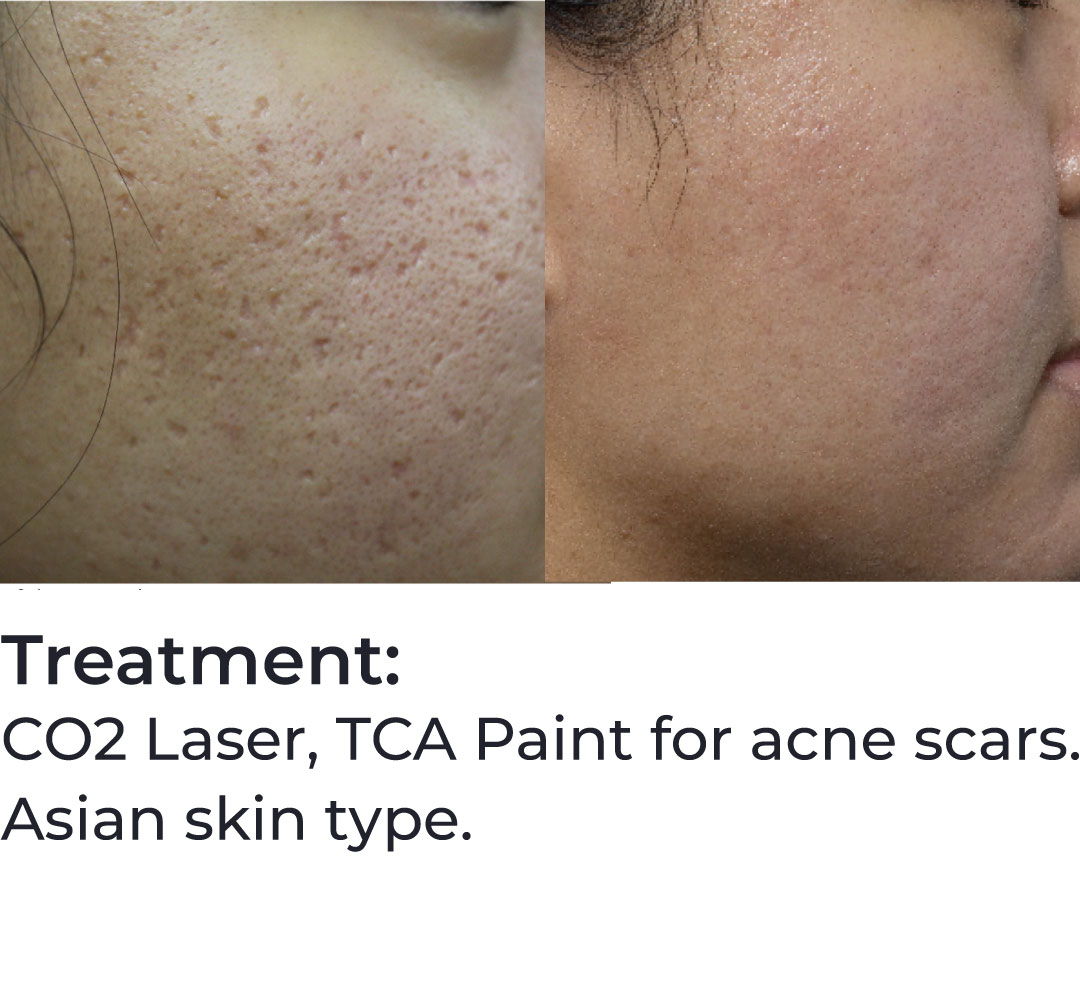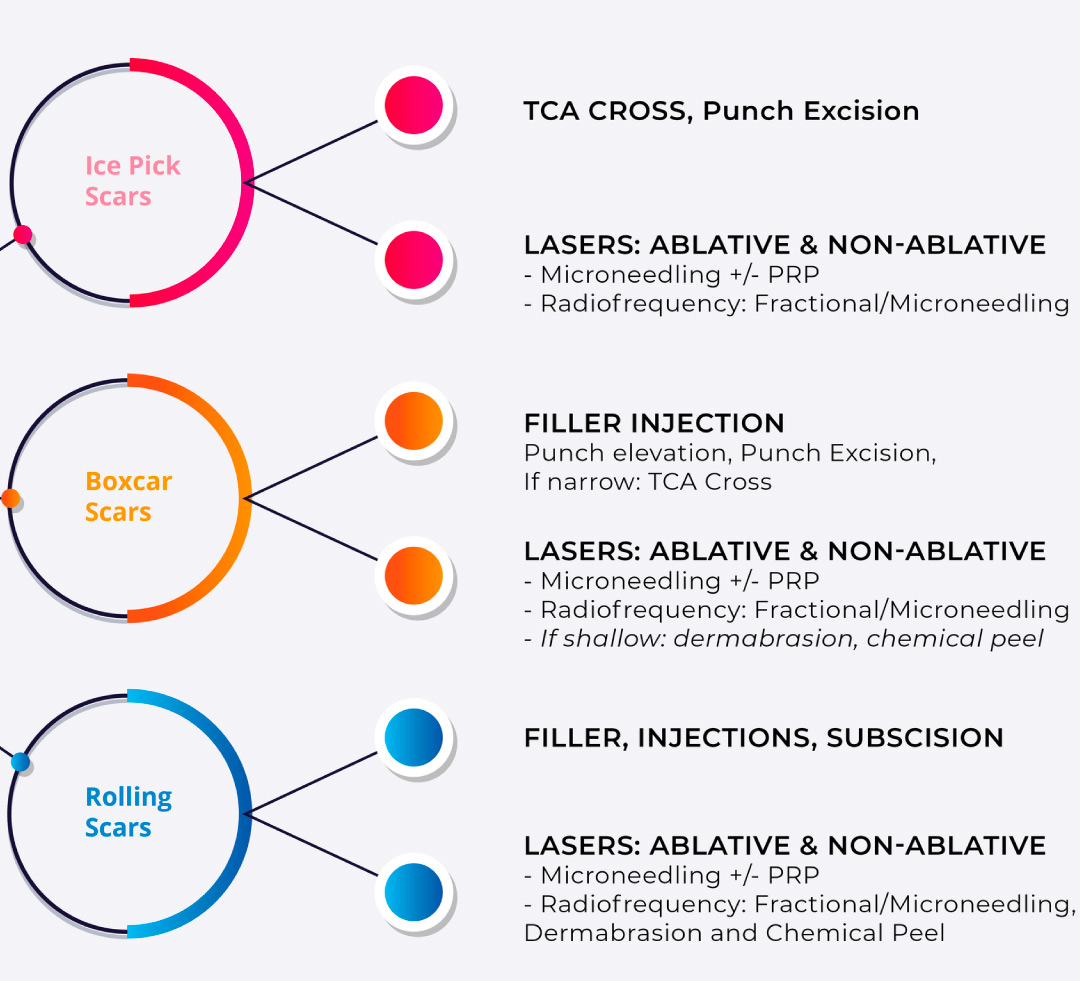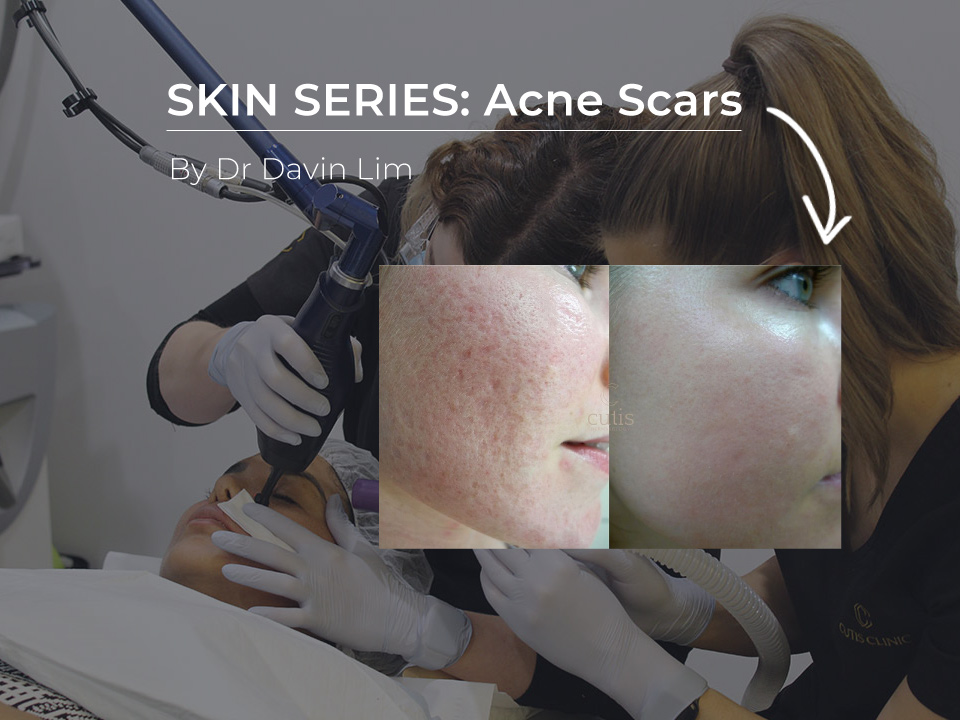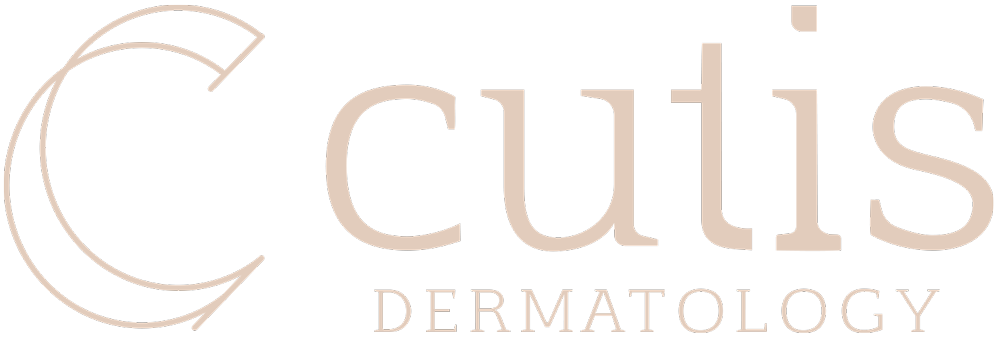What can our Acne Scar Repair Series treat?
- Rolling scars
- Boxcar scars
- Atrophic varieties (dips & divots)
The aim of this program is to provide a global improvement of up to 50 to 80%. For coloured acne scars, including red scars & brown marks, other lasers may be required.
This scar revision series provides a cost effective, yet highly effective avenue to scar revision using the very best & latest lasers. Our team will select the best lasers depending on your skin type, scar type & downtime. This series of treatments consist of 3 laser sessions performed in our laser suites by our specialist clinicians. A series of 3 sessions is $2135 (save $535). T&Cs apply.
Key Points
- Lasers are at the forefront of acne scar removal
- With over 40 lasers & energy devices at our disposal, you can be assured that you will be receiving the most technologically advanced systems
- This series of treatments is designed to reduce most types of acne scars
- Results are seen at 2 weeks, maximal after 3-6 months after the last session
- Recovery is tailored for each patient & ranges between 2 to 6 days
Our results speak for themselves
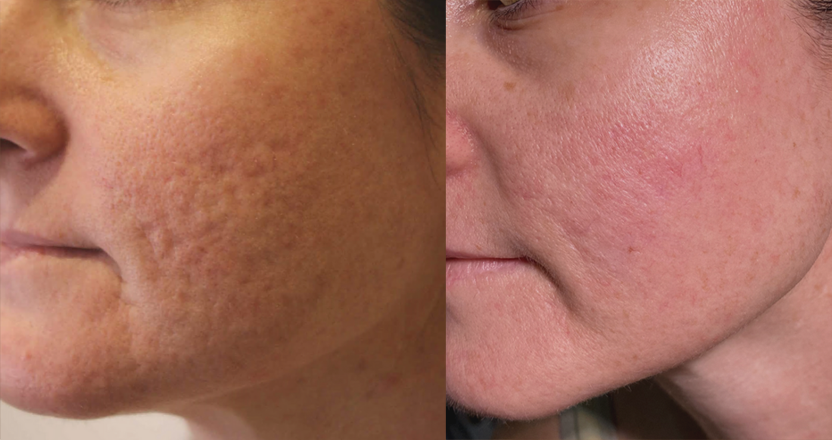
Before
After

Laser resurfacing, Subcision for atrophic acne scars in skin type 2
Ask us more about this treatmant
Preferred Consultation
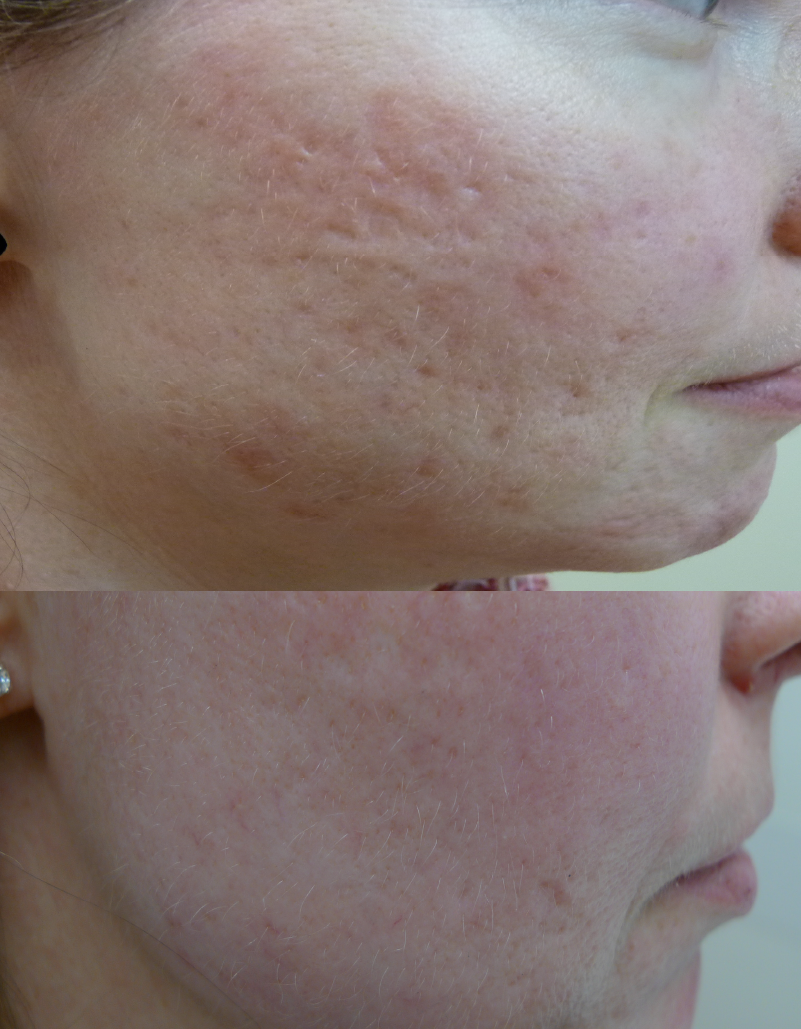
Before
After
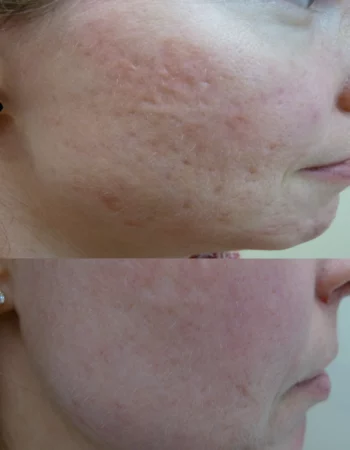
Laser resurfacing & subcision for severe acne scarring. Skin type 2
Ask us more about this treatmant
Preferred Consultation
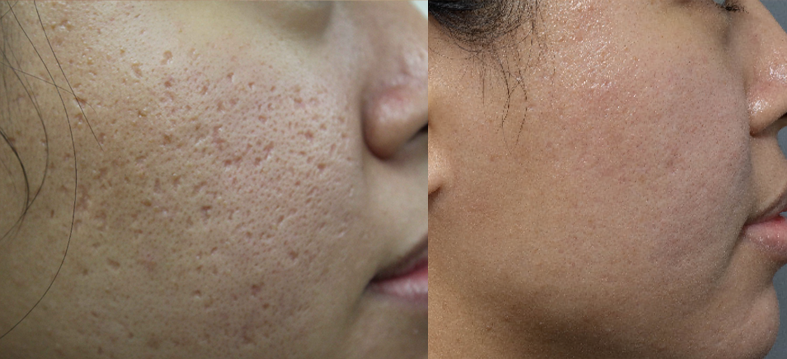
Before
After

CO2 Laser, TCA Paint for acne scars. Asian skin type
Ask us more about this treatmant
Preferred Consultation
Acne Scar Revision Series Info
What types of acne scars can be treated with the Acne Scar Repair Series?
This series is designed to give a global improvement in acne scars, meaning it is a general treatment for most types of acne scars, including rolling, boxcar & atrophic varieties (dips & divots). There will be some treatment bias, namely some forms of acne scarring will respond better to lasers than other scars. The aim of this program is to provide a global improvement of up to 50 to 80%. For coloured acne scars, including red scars & brown marks, other lasers may be required.
*Scar directed treatments often give better outcomes, however add another few levels of complexity & higher costs. Dermatologists are involved for specific treatment of scar signatures. They employ more invasive methods including fully ablative lasers, peels & surgery.
When will I see results?
Results can be seen within 2 weeks, however maximal at 3-6 months after your last treatment. This is because it takes time for your body to generate collagen & remodel scarring. Eating healthy & keeping your acne under absolute control will amplify your gains.
How many sessions are required?
This series consists of 3 laser sessions, spaced 4 to 8 weeks apart. Treatments are spaced to ensure you heal fully from each session. The intervals are chosen for maximal collagen stimulation.
Does it hurt?
Treatments are comfortable. We use specialist strength numbing gel & skin cooling. For more involved procedures, a prescription of painkillers are administered prior to the laser.
What is the recovery following a laser treatment?
We can tailor laser settings to match allowed recovery times, ranging from 48 hours to 6 days. Your laser clinician will discuss downtimes prior to treatments. As a guide-
- 2-4 day recovery: Pico lasers, CO2 light setting, Hybrid lasers, Fraxel
- 4-5 day recovery: CO2 medium + Hybrid
- 5+ day recovery: CO2 heavy
How much does acne scar revision cost?
This laser series is designed to provide access to the best lasers used in dermatology, at a cost-effective price.
- Single treatment (with any fractional laser/s): $890
- Laser series of 3 sessions (with any fractional device): $2135 (save $535)
*Selection of fractional lasers we use include CO2 fractional laser, eCO2, Ultrapulse, Mixto, CO2RE, erbium fractional lasers, Fraxel, 1440 laser, & Alma Hybrid lasers. The same applies to high pass pico lasers including Picoway & Picosure Pro.
What lasers do we use to revise scars?
Cutis Dermatology Brisbane has one of the largest portfolios of lasers in the Southern Hemisphere, with over 40 lasers & energy devices. Your clinician will pick from a selection of fractional devices including-
- Fractional CO2 lasers: eCO2, CORE, Mixto, Ultrapulse, Hybrid
- Hybrid lasers: 1570 Alma
- Fraxel Laser: 1927, 1550
- Pico fractional lasers: Picoway, Picosure Pro
With the Acne Scar Repair Series, your technician can mix & match various combinations of lasers. This ensures that you are getting the best treatments & are not ‘locked in’ to one type of laser.
Who performs this procedure?
Acne Scar Repair Series treatments are performed by nurses at Cutis Dermatology. They have been extensively trained by our procedural dermatologists. Our nurses have undertaken additional studies in scar revision, not only with lasers, but with other techniques including TCA CROSS, RF microneedling, pico & vascular lasers as well as treatments & injectables.
*You can request this treatment to be performed by a consultant dermatologist, however the price per session varies between $1490 to $1990, depending on the specialist. This package, performed by nurses is designed to produce results whilst at the same time being cost effective for patients.
How long does each procedure take?
Numbing gel application (in clinic): 60 minutes.
Laser time: 15 to 30 minutes, depending on the extent of scarring & laser system we employ.
Total time: 1.25 to 1.5 hours.
How does laser treat acne scarring?
Laser work by scar remodeling & neocollagenesis- or collagen stimulation. Laser light targets the lower layer of skin, the dermis. Light gets converted into heat, heat breaks down scars & stimulates your body’s natural repair mechanisms to remodel scar tissue. Hence the outcome depends on your immune system’s efficiency at remodeling collagen.
Fractional pico lasers are used to treat pigmented acne scars, known as post-inflammatory hyperpigmentation. Your clinical will guide you through the process of scar revision & advise you of the best laser to treat your primary scar signature/s.
Can I have this treatment if I am on acne medication?
Yes. Revisions to the acne medication guidelines were conducted in 2016. Most procedural dermatologists will follow these revised protocols that are based upon evidence based medicine. Treatments such as fractional lasers, RF, RF microneedling, focal deep peels, & microneedling can be conducted on acne medication.
This scar revision series provides a cost effective, yet highly effective avenue to scar revision using the very best & latest lasers. Our team will select the best lasers depending on your skin type, scar type & downtime.
Why is it essential to control acne during the scar revision process?
One word- inflammation. If your skin is inflamed during your treatment process, your outcomes will not be optimal. It is not ‘relative control’ (relative to how severe your acne was), it is about absolute control. You can not build muscle if you have inflammation (secondary to muscle strains), the same thing applies to skin. Collagen formation is best in the absence of inflammation.
A medical dermatologist can assist you in treating your acne if you are still undergoing breakouts.
What are other methods we use to treat acne scars?
The acne scar revision algorithm is complex as there are ‘optimal’ modalities for different scar signatures, coupled with variables such as skin type, downtime & patient expectations/concerns & wishes, the combinations can be confusing. For complex algorithms our specialist dermatologists are involved in scar treatment. They employ-
- Fully ablative lasers
- Deep RF devices
- Surgical excision
- Subcision
- Deep focal peels
- treatments
How do dermatologists treat acne scars?
Dermatologists approach scarring at a specialist level, meaning we employ specific strategies to remove scar tissue & remodel collagen. As a guide, they are more ‘scar centric’, meaning they employ optimal treatments to treat specific scar signatures. Treatments include fully ablative lasers, excisional modalities (surgery), multi-level sharp dissection & subcision as well as soft tissue augmentation using treatments & fat transfer. Whilst in some cases these treatments are more effective, the recovery time is generally longer & so are the costs.
*Cost associated with scar revision by a dermatologist comes down to the complexity required for revision, assistant times (nursing time), in addition to operating theater time.
What are important aspects to understand regarding this treatment series?
Now for the fine print regarding scar revision & lasers. These are super important concepts to understand-
- Cost vs outcome ratio. This treatment series is designed to improve acne scars whilst at the same time ensuring that costs are kept to a minimum. The way we keep costing down is to minimize the hands-on time by our dermatologists, hence why treatments are performed by our experienced nurses at Cutis Dermatology.
- Downtime vs outcome ratio. Though we rock the most technologically advanced laser systems, you must expect some element of recovery. Within reason, the longer the downtime the better the results. Recovery ranges from 48 hours to 6 days. Short recovery lasers include the Picosure & Alma Hybrid systems.
- Remainder biased. This refers to the scars that may not respond to this program. Remember that this series is designed to globally improve acne scarring. It is not designed to remove individual scars (however our nurses will do their very best to address your specific concerns). For individual scars, a specialist dermatologist may be involved.
- Treating darker skin types. Darker skin types are more complex, mainly because big settings with lasers will give post inflammatory hyperpigmentation, or skin darkening. Hence it is important to balance the outcomes, with the duration of PIH. Your clinician will discuss this with you prior to treatments. For gentle laser settings, your program may be extended to a second or third series of lasers.
- Control of acne. Time & time again, this is one of the most important factors to consider because, firstly, this is under your control, & secondly it determines the efficiency of your immune system’s ability to remodel collagen & acne scarring.
- Additional treatments. Other treatments may be required to address reminder biased scars, or to treat scar types based upon scar signature. These include surgical revision procedures as well as soft tissue treatments & deep focal TCA peels. Targeted scar revision is performed by our senior consultant dermatologists.
- Age related changes. This is an important concept to understand if you have maturity on your side. After 20, collagen decreases by 1-1.5% per annum. This collagen loss adds to the deficit of collagen within atrophic scars. The older you get, the more you play catch up. If you can not replenish collagen, soft tissue dermal injectables such as Profhilo, PLLA, CAH & PCL injections can give you a helping hand.
- Variable outcomes. The bell curve. It’s reality. Some lie to the right of the curve & can produce & remodel more collagen than others. Ethnicity also plays a role. Darker skin types can remodel collagen more effectively than lighter skin types; at the expense of increased incidence of hypertrophic scars & hyperpigmentation. You can not alter genetics, but eating healthy & controlling skin inflammation gives you the highest chances of efficient collagen remodeling.
- Skin health. Eating & living healthy makes a world of difference. Smokers often require 2-3 times more treatments than non-smokers.
Can I have RF microneedling instead?
Sure. At Cutis Dermatology Brisbane we employ the most advanced RF microneedling systems, including Genius RFM & Morpheus8 (coming soon). Though RF systems have some advantages over lasers (slightly faster healing times, less skin color changes in general), we find that lasers outperform RF devices when it comes to general improvement of acne scars.
RF microneedling is best for deeper rolling acne scars, whilst lasers are much better for superficial acne scars, including boxcar, polymorphic, & shallow atrophic scars.
What are the potential side effects of laser treatment?
Fractional lasers have a high safety margin, however side-effects, though rare, can be encountered. They include-
- Flare up of pigmentation: melasma flare ups, rare & can be mitigated in most cases.
- PIH or post inflammatory hyperpigmentation. Defined as unexpected prolonged pigmentation, as opposed to predictable pigmentation seen in darker skin types. Treated with pico lasers & pigment inhibitors.
- Persistent redness. Rarely seen with fractional lasers, may flare up rosacea, but treated with vascular lasers & anti-inflammatories.
- Infection. Rarely seen with fractional lasers.
What are the finer points of laser selection for acne scarring?
Select the correct tool for the job. A carpenter can build a table with a saw & hammer, but it won’t be a good one. The same applies to lasers & acne scar revision, hence why at Cutis Dermatology Brisbane we have a wide range of lasers and energy devices. Your clinician will select a correct laser for your scar revision series, based on your scar type, your skin color & your allocated downtime. Here are our thought processes when it comes to laser selection.
- eCo2 fractional CO2. Great overall laser, this device is good for most skin types & is powerful enough to treat deep rolling scars.
- Hybrid Alma. Best laser for low downtime, additionally it can treat darker skin types with little to no downtime & post inflammatory pigmentation.
- ProFractional HALO-erbium laser. Outdated, HALO by Sciton is not powerful enough to treat most scar types as it has 15 times less penetration (erbium) than Profractoinal. Our dermatologists may employ deep fractional erbium for some cases.
- Fraxel Dual. Great for skin rejuvenation, but underwhelming for acne scars. Hybrid 1570 is better.
- Fraxel RePair: Again outdated, better CO2 systems.
- Ultrapulse. Awesome for some types of scars, primarily used by our specialists.
- Mixto. Good laser, but others better. We hardly use it.
- YouLaser MT. Generation 1 hybrid, Alma system is generally better & more powerful.
- CORE. Great laser for superficial scars, we occasionally use it.
- Picoway. Best laser for post inflammatory hyperpigmentation.
- Picosure. Best laser for small enlarged pores, general skin rejuvenation in darker skin types.
